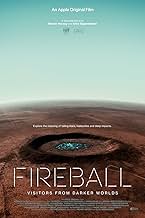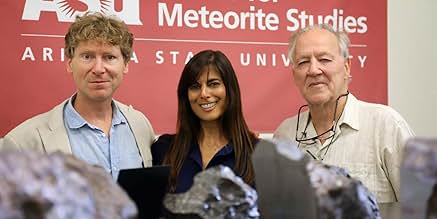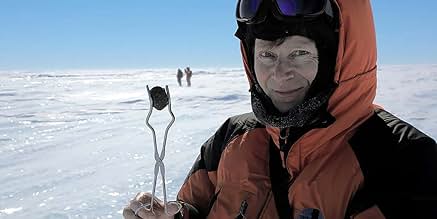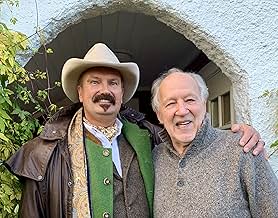Fireball: messaggeri dalle stelle
Titolo originale: Fireball: Visitors from Darker Worlds
VALUTAZIONE IMDb
6,9/10
4023
LA TUA VALUTAZIONE
Un nuovo documentario di Werner Herzog su meteore e comete e la loro influenza sulle antiche religioni e altri impatti culturali e fisici che hanno avuto sulla Terra.Un nuovo documentario di Werner Herzog su meteore e comete e la loro influenza sulle antiche religioni e altri impatti culturali e fisici che hanno avuto sulla Terra.Un nuovo documentario di Werner Herzog su meteore e comete e la loro influenza sulle antiche religioni e altri impatti culturali e fisici che hanno avuto sulla Terra.
- Regia
- Sceneggiatura
- Star
- Premi
- 2 candidature totali
Recensioni in evidenza
When you watch a documentary by Werner Herzog, what you get isn't just your traditional well narrated documentary. It's a journey. A journey through the world and through different cultures with a specific theme. This time, this specific theme are Meteors and it's origins. Werner Herzog behind the camera and also serving as the narrator, he again comes with support, and like with "Into the Inferno " (2016) this support is the charismatic Volcanologist Clive Oppenheimer.
Calling "Fireball" a traditional documentary isn't the right term. It's a mesmerizing mixture containing the power of science, spectacular pitctures and music. Combined with Herzogs relaxing voice, this documentary works more like a lucid dream than a simple documentary about Meteors. If you watched Into the Inferno on Netflix, you kinda know what to expect. Into the Inferno is also brillant and I cannot recommend it enough. If you have watched Fireball on Apple TV before and now wanna dig deeper into this Arthouse-Documentary style, go for it.
If you plan to watch Inferno, relax, enjoy it with a good Whisky or Whine and let it absorb you. In my opinion, only Werner Herzog is capable of grabbing the viewer in such a way.
Calling "Fireball" a traditional documentary isn't the right term. It's a mesmerizing mixture containing the power of science, spectacular pitctures and music. Combined with Herzogs relaxing voice, this documentary works more like a lucid dream than a simple documentary about Meteors. If you watched Into the Inferno on Netflix, you kinda know what to expect. Into the Inferno is also brillant and I cannot recommend it enough. If you have watched Fireball on Apple TV before and now wanna dig deeper into this Arthouse-Documentary style, go for it.
If you plan to watch Inferno, relax, enjoy it with a good Whisky or Whine and let it absorb you. In my opinion, only Werner Herzog is capable of grabbing the viewer in such a way.
This film just puts science and fiction into the realms of extraordinary possibilities beyond our own human existence. It is at once real and incredible, probing into the messages from light years away that showcases a magical, if sometimes frightening, expanse that's beyond our wildest imagination. And the real treat, and stunning truth, is that science is showing us how space and the cosmos is so much so connected to us at the core.
I was curious to watch this documentary as I've always been fascinated about the impact of celestial bodys hitting the earth and it's effect on human evolution, religion, and beliefs. Although beautiful in parts this film has not much new to offer in ways of science, it lacks intrigue becoming somewhat boring all-round. It was more a vignette into peoples lives than it was about meteorites.
One can't go into a Werner Herzog documentary expecting a Discovery Channel or National Geographic style affair. Fireball is characterized by Herzog's iconic eccentricity, off-beat narrative style, quiet but intense narration, and sometimes far fetched and even seemingly non sequitur connections among ideas. He connects science, folklore, art, and other cultural histories through their connections with meteorites. I found this documentary fascinating, mysterious, and in some parts simply beautiful in the humanity on display.
It's purely a coincidence that I am reviewing two documentary features in a row - partly brought on by the fact that I don't yet know where to see The Climb or Wolfwalkers. But following up I Am Greta, a movie that wants us to be really sad about the state of the planet, with one that sometimes basks in the Earth's inconsequentiality next to the rest of the Universe (not that this means we shouldn't treasure it; quite the opposite) was an amusing line-up.
There are very few filmmakers who resonate with me in the same way as Werner Herzog, the German legend who all but dominates the very documentary genre. This isn't because I always admire his films, but rather because of the way the indifference of the unfeeling cosmos seems to fascinate him - along with things that are strange and non-human, including grizzly bears and Baby Yoda.
Herzog finds glee where others are brought despair. The non-discriminating, inevitable reality of death, and the chaotic forces that may one day annihilate all of us in a single swoop (no matter how important we deem ourselves, or how desperately we believe in divine reward and greater purpose), are depressing reminders to some, while others look at them with fascinated awe. The only thing I like more about Herzog is the accent.
In Fireball: Visitors From Darker Worlds (viewable on Apple TV), Herzog looks at meteors, as well as the sort of people who have made it their life to look at meteors. We also learn what meteor strikes have come to mean for various hopeful cultures and individuals around our spheroid (a museum in France even carries a message for potential alien visitors, meant to be found if we don't survive the next asteroid hit, and Herzog expectedly jokes about the optimism in the faith that aliens will understand Modern French).
Some peoples have taken meteorites as a sign of our importance (a message from Someone Greater), whereas scientists might take it as a sign that there is insurmountably more to existence than humanity - which is fine.
At Herzog's side is volcanologist Clive Oppenheimer; not to be confused with Joshua Oppenheimer, another giant in the world of documentary film (Herzog was an executive producer on his masterfully disturbing Look of Silence in 2015). But as documentary films go, Fireball is indeed made with expertise, focusing on well-selected subjects and being very well-shot (I found the use of drone cameras to be unusually effective, adding some "size" to our aforementioned spec of a home by transitioning from space rock close-ups to long-shots of an Alsatian vista).
Many of the characters we meet are as fascinating as the very exploration of meteorides and forces immeasurably older than ourselves - particularly delightful, in my opinion, is the Norwegian man who revolutionized the research of so-called micrometeorites; items that fell from space, scarcely the size of a dust grain. A character we don't see enough of, according to some reviewers, is Herzog himself.
But following Oppenheimer (who conducts most of the interviews) is fun too, and Herzog's narrations are more than enough this time. The essentials are still there. We are still very much reminded that, sometimes, the things that make us seem so unfathomably small can also make us feel so unfathomably lucky that we're alive to explore them; that we exist in an age with the right tools; that our place in the solar system even allowed for evolution to reach this point; that the latest Apollo asteroid strike, a moment of immense destruction, made it so we could eventually live.
Who knows? There may even be a reason these stones made their way to humankind after all; something that made them seek us out. Then again, I might just have watched too much Goop Lab to be entirely rational. I hereby issue my apologies for that last bit.
A quick note, just so I can flex my knowledge since kidhood: I have not misspelled the word "meteorite" when speaking of "meteorides" earlier in this post. A meteoride is a piece of space debris (usually from a comet or asteroid, both of which distinguish themselves from meteorides in that they actually orbit a star) that becomes a METEOR when entering a planet's atmosphere, and METEORITE if it lands on the surface.
There are very few filmmakers who resonate with me in the same way as Werner Herzog, the German legend who all but dominates the very documentary genre. This isn't because I always admire his films, but rather because of the way the indifference of the unfeeling cosmos seems to fascinate him - along with things that are strange and non-human, including grizzly bears and Baby Yoda.
Herzog finds glee where others are brought despair. The non-discriminating, inevitable reality of death, and the chaotic forces that may one day annihilate all of us in a single swoop (no matter how important we deem ourselves, or how desperately we believe in divine reward and greater purpose), are depressing reminders to some, while others look at them with fascinated awe. The only thing I like more about Herzog is the accent.
In Fireball: Visitors From Darker Worlds (viewable on Apple TV), Herzog looks at meteors, as well as the sort of people who have made it their life to look at meteors. We also learn what meteor strikes have come to mean for various hopeful cultures and individuals around our spheroid (a museum in France even carries a message for potential alien visitors, meant to be found if we don't survive the next asteroid hit, and Herzog expectedly jokes about the optimism in the faith that aliens will understand Modern French).
Some peoples have taken meteorites as a sign of our importance (a message from Someone Greater), whereas scientists might take it as a sign that there is insurmountably more to existence than humanity - which is fine.
At Herzog's side is volcanologist Clive Oppenheimer; not to be confused with Joshua Oppenheimer, another giant in the world of documentary film (Herzog was an executive producer on his masterfully disturbing Look of Silence in 2015). But as documentary films go, Fireball is indeed made with expertise, focusing on well-selected subjects and being very well-shot (I found the use of drone cameras to be unusually effective, adding some "size" to our aforementioned spec of a home by transitioning from space rock close-ups to long-shots of an Alsatian vista).
Many of the characters we meet are as fascinating as the very exploration of meteorides and forces immeasurably older than ourselves - particularly delightful, in my opinion, is the Norwegian man who revolutionized the research of so-called micrometeorites; items that fell from space, scarcely the size of a dust grain. A character we don't see enough of, according to some reviewers, is Herzog himself.
But following Oppenheimer (who conducts most of the interviews) is fun too, and Herzog's narrations are more than enough this time. The essentials are still there. We are still very much reminded that, sometimes, the things that make us seem so unfathomably small can also make us feel so unfathomably lucky that we're alive to explore them; that we exist in an age with the right tools; that our place in the solar system even allowed for evolution to reach this point; that the latest Apollo asteroid strike, a moment of immense destruction, made it so we could eventually live.
Who knows? There may even be a reason these stones made their way to humankind after all; something that made them seek us out. Then again, I might just have watched too much Goop Lab to be entirely rational. I hereby issue my apologies for that last bit.
A quick note, just so I can flex my knowledge since kidhood: I have not misspelled the word "meteorite" when speaking of "meteorides" earlier in this post. A meteoride is a piece of space debris (usually from a comet or asteroid, both of which distinguish themselves from meteorides in that they actually orbit a star) that becomes a METEOR when entering a planet's atmosphere, and METEORITE if it lands on the surface.
Lo sapevi?
- QuizWill mark the third collaboration between Werner Herzog and Clive Oppenheimer after Dentro l'inferno (2016) and Incontri ai confini del mondo (2007).
- ConnessioniFeatures Deep Impact (1998)
I più visti
Accedi per valutare e creare un elenco di titoli salvati per ottenere consigli personalizzati
Dettagli
- Data di uscita
- Paese di origine
- Lingua
- Celebre anche come
- Fireball: Visitors from Darker Worlds
- Luoghi delle riprese
- Mecca, Arabia Saudita(Kaaba Black Stone)
- Aziende produttrici
- Vedi altri crediti dell’azienda su IMDbPro
- Tempo di esecuzione
- 1h 37min(97 min)
- Colore
Contribuisci a questa pagina
Suggerisci una modifica o aggiungi i contenuti mancanti









